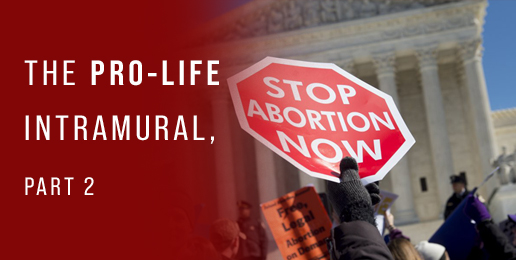
Last time, we discussed the two sides of the intramural pro-life debate: abolitionists and prudentialists. And we observed that each side has a valid perspective based on a very true aspect of the issue. But shall the twain ever meet?

Does the pro-life movement have to be split between pragmatists and zealots, or is there a holistic approach that both sides can contribute to?
Well, I think the first thing to recognize is that both sides have compelling points because both are right about certain important truths. The concept of a physical road illustrates this. Imagine that you’re standing in the middle of Evil City and you need to flee to the City of Righteousness along a road that connects the two.
Running from one to the other requires you to take a long series of individual steps.
The abolitionists are correct to point out that the endpoint of your step #1 is still squarely within Evil City. And so is the endpoint of step #2. And #3. If you celebrate the action of step #1 as if it were the goal in and of itself, you’d stop running and still be stuck squarely within Evil City. Step #1 was a transition from an evil starting point to, well, an evil endpoint.
In that sense, it’s a settlement, not a victory.
Yet, the prudentialists are correct to point out that you can’t possibly get to the City of Righteousness without taking step #1. You can’t get to the endpoint of your journey without taking these steps. You can look at the ground in front of you and say, “boy, that’s a really evil section of road right there. I don’t think I could walk on that in good conscience.”
And you’d be paralyzed right where you are inside Evil City while you wait to be teleported out.
Or, you can remind yourself that the endpoint of your journey is the City of Righteousness, and that this is the necessary next step to get there.
As the Chinese proverb goes, “the journey of a thousand miles begins with a single step.”
Of course, there are responses on both sides. The abolitionists could correctly point out that this world is ruled by a sovereign God. He doesn’t need to operate in increments the size of puny human footsteps.
He didn’t ask the Israelites to take a “prudentialist” approach to crossing the Red Sea or conquering Jericho. And He doesn’t need your feeble human wisdom to accomplish great and mighty things. But the prudentialists could also reply.
God certainly is able to operate outside the limits of our environment, but He doesn’t always choose to accomplish His purposes this way. Wilberforce shows us an example of a man who would have wanted to abolish slavery immediately, but the sovereign Lord did not allow it.
Instead, He used Wilberforce’s persistent efforts to bring about great and mighty things on a slower timetable.
The two sides can go back and forth ad infinitum and continue to demonstrate the truth in their respective sides. But ultimately, I think that it’s important to combine these two perspectives into a unified approach to the pro-life cause.
There will always be tension, but there need not be contradiction. I hope every pro-lifer can retain the passionate heart of an abolitionist alongside the wisdom of a prudentialist—neither is sufficient without the other.
I hope even most abolitionists could agree with me that a 15-week ban—while seeming to legitimize abortion before that arbitrary mark—still saves the individual lives of every baby older than that mark. The mark may be arbitrary, but isn’t it better to save lives arbitrarily than not at all?
And I likewise hope most prudentialists could agree with me that the wisdom of men is foolishness in God’s sight, and that it is often through the most seemingly imprudent of means that the Lord glorifies Himself the most spectacularly.
Even with all the realistic strategizing that human wisdom calls us to do, we should never cease praying for an immediate end to abortion and living in the faith that the Lord can bring it about at any moment.
Ultimately, I think that if we are given an opportunity to take a single step in the right direction, we should do so. (After all, the current abortion landscape in America is the product of a series of many steps in the wrong direction—the progressives didn’t do this all in one night.)
However, our goal should never be to just “take steps.” Our goal should be to “arrive at the destination.” Steps are the unfortunate tool we have to use when—despite our fervent prayers—the Lord keeps our legs short and keeps the destination far away.
Gradual steps should be a tactic, not a strategy.
A strategy is your overall game plan based on your goals, a tactic is a specific maneuver that you adopt in a particular situation. We shouldn’t march out to battle aiming to just make small, politically feasible steps, and go home happy as long as we do just that.
Rather, we should expect to win, and win big. But in particular situations where—despite our prayers—the Lord does not part the Red Sea, we should be willing to accept the little concessions we can squeeze out of the opposition.
After all, isn’t there something in Scripture about the kingdom of God starting as small as a mustard seed?






















